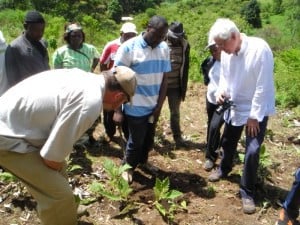
The people of Wabane, Lebialem Division, SW Cameroon have pledged their support and collaboration to the Echinops giganteus project, a project they have described as enormous and beneficial. They made this pledge on May 21, 2014 during a working visit of the Director General of French enterprise, V.MANE Fils, Mr. Michel Mane, Project Coordinator at French charity Man and Nature, Eric Belvaux and a delegation from ERuDeF. The aim of the visit was to inspect ground work on the production of Echinops giganteus and to formalize partnership with the Cameroon government. This falls within the framework of the Nagoyal Protocol-Access Benefit Sharing (ABS) signed in Japan in 2010, stating that local communities should benefit from the exploitation of their natural resources.
Echinops giganteus is a plant that has been found to contain aromatic potentials by the French enterprise. Mr. Mane, Director General of French enterprise V. MANE Fils, explained his rationale of getting involved in the production of cosmetic products and partnering with ERuDeF to encourage its production in Cameroon. Echinops comprises between 125 and 130 species and grow in open grassland. It is widely distributed in Nigeria, Zaire, Rwanda, Sudan, Ethiopia, Uganda, Tanzania and Cameroon. The presence of the plant in Magha gave birth to the Echinnops giganteus project which falls under the Livelihoods and Economic Development component of ERuDeF.
Mr. Mane arrived Cameroon on Monday, May 19th 2014, to join Mr. Eric Belvaux, Program Coordinator for Man and Nature Association, who had arrived Cameroon one week earlier. The duo was accompanied by an ERuDeF team to Mahga, to assess the potential of the plant in this area.
Inaugurating the newly created Echinops cooperative in Magha, Mane thanked the villagers for their hard work and commitment in the Echinops giganteus project. He also presented a brief history on how the Echinops project started, saying that it all began in 1999 when one of Mane’s partners proposed the plant to him saying it could be of importance to him, since his organization deals in aromatic and pharmaceutical products. He then discussed it with the Director of the French charity, Man and Nature, who collaborated with ERuDeF to locate and carry out research on the plant. The plant was discovered to be growing in the wild in Magha and following the Access Benefit Sharing-ABS policy recently instituted in Cameroon, Mane, through ERuDeF, has been concerned with encouraging the cultivation of this plant in Magha, so that both his organization and the people of Magha as well as the government of Cameroon can benefit.
Mane presented a sample of the essential oil derived from the echinops plant, for the community to see and smell by use of what he called, paper blotters. Excited by Mane’s presence and the demonstration of the echinops essential oil, the people of Magha promised to continue collaborating with Mane and ERuDeF, in order to make the project bigger since according to Mane, they are still at the pilot and research phase of the project. The villagers also used the opportunity to thank their visitors for the newly opened cooperative, the support of the bee keeping project and other development initiative this project has brought to their community.
The Assistant Project Coordinator of the Echinops project, Lea Kenmene also encouraged the people to work harder in order not to lose the benefits this project would bring to their community, since plans are already underway to move the project to the commercialization phase. She reminded them that the project started in 2012 with an agronomic study on the plant. Sample seeds were provided and villagers were trained on how to cultivate Echinops giganteus and that the arrival of Mr Mane was the result of their hard work.
The President/CEO of ERuDeF, Louis Nkembi on his part, thanked the Cameroon government for giving the opportunity to sustainably manage natural resources for the benefit of both partners and local communities, and Mr. Mane for accepting to respect the provisions of the 2010 Nagoyal Protocol- ABS convention signed in Japan
On his part, the Mayor of Wabane Council, Nembo K. Isreal, said that ‘community expectations from this project are very high, because we are in an enclosed and underdeveloped community and we welcome any thing that can alleviate poverty and improve the living conditions of the people. If the state of Cameroon is involved in this project which we know is a big one, it should help us institute a good road network in this area because it is difficult for villagers to transport their farm produce to the main road which is about 70km away; we need electricity and more. Our area has suffered natural disasters and needs rehabilitation.’ he said. The Mayor also assured their commitment to the project as long as his locality stands to benefit in the process. He requested for a free flow of information between Paris and Wabane to avoid any misunderstandings, as has been the case with other partners in the past.
To quench the curiosity about what the community would benefit from the project, Mane explained that it is still early and difficult to say with certainty what Magha will get in exchange of Echinops giganteus, since that depends on if the market is going to welcome the cosmetic product that would be made from Echinops giganteus. He further explained that the essential oil gotten from echinops is just one amongst the about 3000 components used in producing a single cosmetic product.
A traditional dance ushered the team out of the cooperative premises, to the cultivation sites of plant. After the first and second stops to plots one and two respectively, observation was that direct seeds do better than transplanted plants. However, the duration of the plant before it is ready for harvest could not be determined just yet. The team also visited the reforestation site, where a landslide had occurred killing over 20 persons.
By Immaculate Mkong



